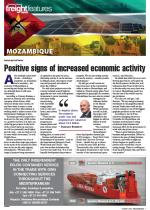Transportes Carlos Mesquita has invested heavily in the expansion and diversification of its f leet, acquiring 100 side tippers, in particular to service the minerals sector.According to commercial administrator Orlando Mesquita, until last year the f leet largely comprised f latbeds, low beds and rear tippers.“Our decision to purchase more side tippers was done with the mining sector in mind as we want to grow our footprint in this industry,” Mesquita told Freight News. “ We do, however, have plans in place to increase the f leet annually as part of an ongoing strategy to diversify. The goal is to have a far more diversified transport solution for our current and potential customers operating in the southern Africa region.”He said continuous enterprise resource planning (ERP) developments were also taking place – aimed at improved customer-centric services, with increasedproximity to the customer base andbetter information.According to Mesquita, there are several investment opportunities for companies in Mozambique, particularly in the extractive industries. “Oil and gas are two industries we are keeping a close eye on and where we see further developments. Agriculture and manufacturing also offer increased opportunity.”Logistics operators in the country, however, do face challenges, and several improvements are required to overcome these.“Bad road conditions in some sections of the EN1, which is the main road in the country connecting the north to the south, do impact transport operations,” said Mesquita. “Another challenge is the bureaucratic processes in Mozambican ports, although we are seeing improvements in this regard.”He said the absence of a body to regulate unfair competition between road hauliers was another stumbling block, while border congestion continued to increase transit times and costs for cross-border transportation.The macroeconomic instability that reduced the investment capacity of many Mozambican companies in the logistics sector was also worrying, said Mesquita. “Other concerns for us include the poor digitalisation and system integration in the logistics sector in the region, while the high bank interest rates inhibit the growth potential of our sector. The drastic increase in shipping line costs, which increase the logistics cost component for parts/consumables and other accessories, has also had a massive impact.”Mesquita said volumes had declined in recent years, especially after the global pandemic. This year the conf lict between Russia and Ukraine has impacted volumes, as has the ongoing military conf lict in the north of Mozambique that put a halt to oil and gas developments. “This significantly reduced the volumes to the northern parts of the country. Regional and global economic recessions due to the pandemic also continue to have an impact – as has the lack of capacity by shipping lines to offer logistics equipment such as containers.”While it is difficult to predict the future in these current and uncertain times, Mesquita said Mozambique was recovering from the effects of the pandemic, and the level of economic activity in the country was rising. “It is a trend that we expect to continue going forward,” he said. “This year, we have seen major improvements in the main ports in – Maputo, Beira and Nacala. These infrastructure and technology improvements are primarily aimed at increasing port capacity and performance.”

